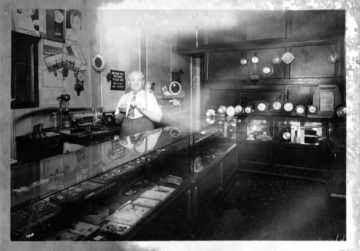by Akim Reinhardt
 3QD: The old cliché about a guest needing no introduction never seemed more apt. So instead of me introducing you to our readers, maybe you could begin by telling us a little bit about yourself, perhaps something not so well known, a little more revealing.
3QD: The old cliché about a guest needing no introduction never seemed more apt. So instead of me introducing you to our readers, maybe you could begin by telling us a little bit about yourself, perhaps something not so well known, a little more revealing.
God: I am, I am.
3QD: Indeed. But what about your early years? We don’t often hear much about your childhood. What was it like to emerge from nothingness? Or did you precede nothingness, first creating the void and then all of the somethings that filled it up? Or, as some speculate, were you and the great nothingness one and the same? Did you, personally, go from nothing to everything?
God:
3QD: Perhaps too difficult to talk about. We’ll let that be. Nonetheless, you quite literally burst onto the scene, creating everything in 6 days. I don’t think it’s worth getting into your sense of time versus human constructions of time, but whether it was six of our days, or six of yours which might be billions of our solar years, it was a phenomenal debut in the truest sense. Bigger than Elvis’ first single, the Beatles first album, or Justin Bieber’s first YouTube video. More gravitas than Shakespeare’s first play, Henry V, Part II. More charisma than Julie Andrews’ screen debut in Mary Poppins. Scarier, in many ways, than Mary Shelley’s Frankenstein, which she wrote when she was just 19. Better received by the public than Gary Coleman’s turn as Arnold “What’chu talkin’ about, Willis” Jackson on Dff’rent Strokes. More disorienting, in many ways, than Joseph Heller’s Catch-22. Some would even say more impressive than Orson Welles’ screen directing/acting debut, Citizen Kane, which he pulled off when he was almost inconceivably young, only 25 years old. But here you were, creating the entire universe and everything in it as your first known work of art. How did you handle that? Were you able to maintain a sense of normality, or, like so many young artists who receive so much fame and praise so quickly, did it damage your sense of self or impede how you related to others?
God: Read more »


 I like to vote in person on Election Day. I’m sentimental that way. My polling precinct is at the local elementary school. So last Tuesday, I woke up early, dressed and got out the door in a rush, and arrived to find not the expected pastiche of cardboard candidate signs and nagging pamphleteers, but rather a playground full of 2nd graders.
I like to vote in person on Election Day. I’m sentimental that way. My polling precinct is at the local elementary school. So last Tuesday, I woke up early, dressed and got out the door in a rush, and arrived to find not the expected pastiche of cardboard candidate signs and nagging pamphleteers, but rather a playground full of 2nd graders.